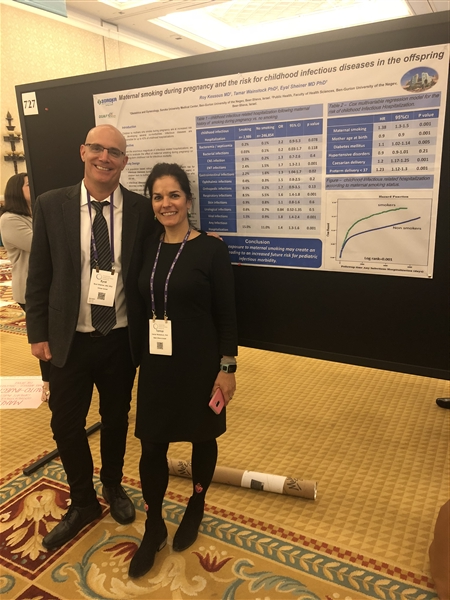
Women who give birth in non-hospital settings in Israel are three times more likely to encounter complications, and particularly perinatal mortality, than their counterparts who have their babies in hospitals, according to new research presented by Prof. Eyal Sheiner and Dr. Tamar Weinstock (pictured above), both of BGU's Faculty of Health Sciences, and Dr. Gil Gutvirtz, of the Department of Obstetrics and Gynecology at Soroka University Medical Center.
Presenting the findings in mid-February at the Society for Maternal-Fetal Medicine's 39th Annual Pregnancy Meeting in Las Vegas, Prof. Sheiner, who serves as Chairman of the Department of Obstetrics and Gynecology at Soroka and Vice-Dean at BGU's Faculty of Health Sciences, compared the births of 3,580 women who delivered babies in non-hospital settings and compared them to some 240,000 women who gave birth at Soroka University Medical Center between 1991 and 2014.
The group found that 15 out of every 1000 babies born in non-hospital settings are at risk of death, compared to just 5 out of every 1000 babies born in hospitals. When accounting for variables including the mother's existing health, age, health habits (for example, whether she was a smoker) and ethnic background, the occurrence of a still-born baby remained significant with a risk 2.6 times higher for mortality of the newborn as compared with patients who delivered in the hospital.
The researchers also found that pregnant women who gave birth outside of hospital settings, either planned or unplanned, were more likely to suffer from fewer pregnancy-related complications such as gestational diabetes, mellitus and high blood pressure. Incidents of complications resulting from the actual births was greater.
"This study matches the findings of larger studies conducted in the United States and confirmed our hypothesis that childbirth in non-hospital settings is far more dangerous than in hospitals," says Dr. Sheiner. "There is no question that a hospital provides the most secure environment to give birth, both for mothers and their babies. Even with the advances of modern medicine, childbirth is still traumatic for both the mother and child and it is critical to prepared for any scenario.
"Perhaps once-upon-a-time the difference between home and hospital for giving birth was less important because of our ancestors' limited understanding of medicine, but today there is a quantum difference. Tracking both the mothers's and baby's progress, heart rate, blood pressure and overall health in real time and immediate access to operating theaters and emergency treatment in the event of a problem gives the medical team the best chance to navigate the difficult situation effectively," he adds.
In addition to their presentation in Las Vegas, Prof. Sheiner and Dr. Weinstock were awarded a certificate of excellence for their 2017 study Fertility treatments and pediatric neoplasms of the offspring: results of a population-based cohort with a median follow-up of 10 years , published in the American Journal of Obstetrics and Gynecology and which has been one of the most oft-cited papers of the past two years.
"It is a tremendous honor that our ground-breaking research has been quoted so often. It's a sign of the impact our research has had on the academic community and we feel deeply grateful for the opportunity to conduct critical research that sheds light on the long-term affects of pregnancy complications," said Dr. Tamar Weinstock.
Media Coverage:
The Jewish Press
The Times of Israel
The London Economic
Israel21C